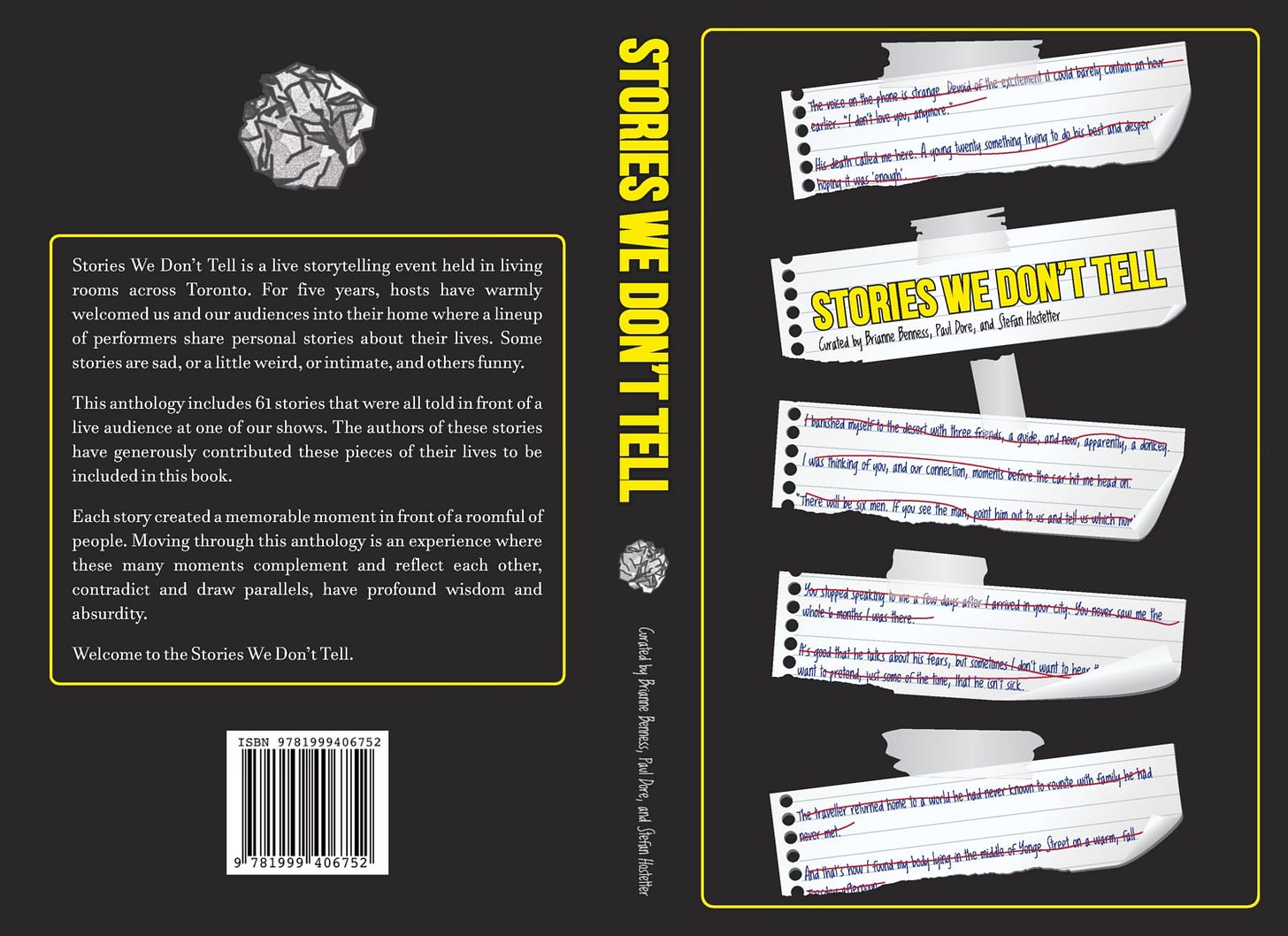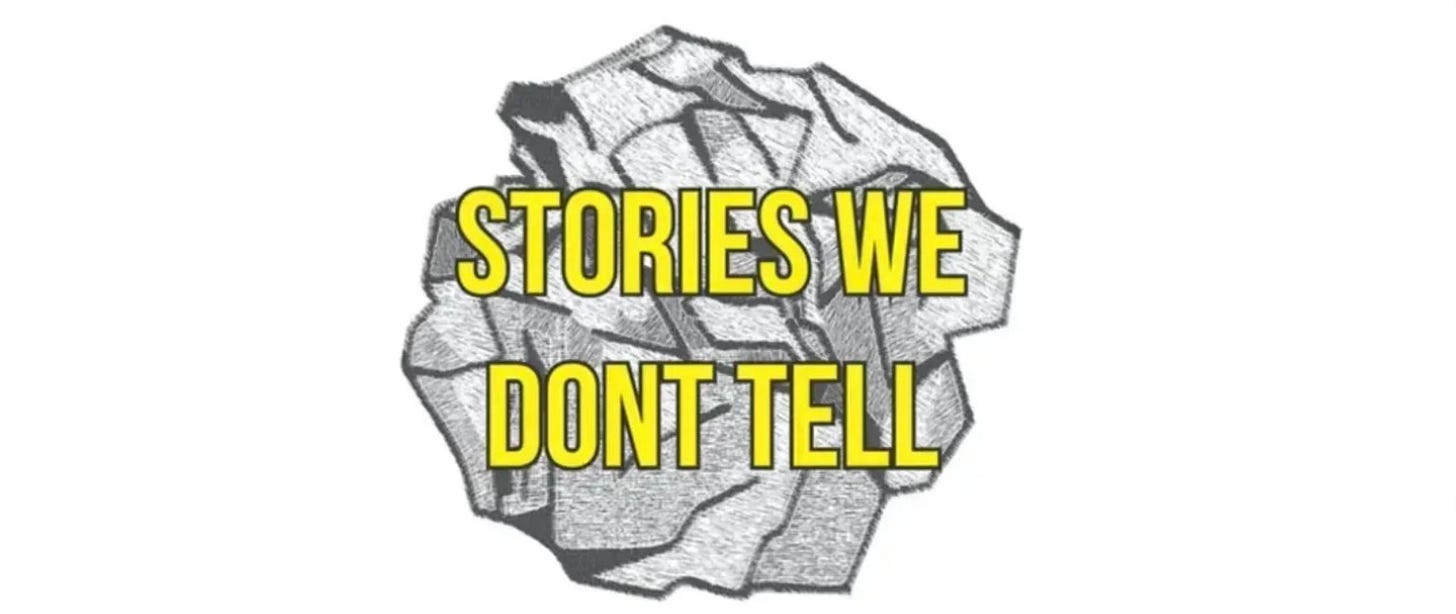I. MARCH EVENT
What Happens Next?
The Stories We Don’t Tell show in January was one of our best attended shows ever. It seems that after almost 10 years, people are still itching to hear personal and intimate stories. This is so heartwarming and we want to give our biggest thanks to the storytellers for sharing their tales, the audience for attending, the Centre for Social Innovation for hosting us, and to our amazing guest hosts Kale and Jake.
So, get ready for our next show happening on March 16th. You can RSVP to the event now at this link. And if you have a story you’d like to share, there is still time! Sign-up at this link to tell a story. Below is more information about the concept of the event from the guest producer.
Here are a bunch of ways to engage with us online and get information on how to participate in SWDT events:
Learn more about the process of telling a story with us.
Check out all workshop and event dates for the entire season.
Use this form to sign-up to join workshops and tell a story.
Listen to the SWDT Podcast.
Get your copy of the SWDT book.
We look forward to seeing you on March 16th!
— The SWDT Crew
II. CALL FOR STORYTELLERS
Do you have a story you’d like to share?
Our first guest producers took over the January event and it was a rousing success. So, without further delay, your Guest Producer for the March event is Martha Chomyn! Martha is a storytelling veteran of our event and others around the city. We’ve already had the first workshop, but there’s still one more (March 2nd) before the next event (March 16th). If you’d like to join us, please fill out this form to get more information.
Bring your usual Stories We Don’t Tell stories to the workshop. And in addition, for this show, guest producer Martha is inviting us to consider our futures with a simple question: what comes next?
We have all had to face experiences when a situation did not turn out the way we had hoped. Perhaps we regret never having taken a risk, or maybe we are still searching for a sense of closure after parting ways with someone important in our lives. Conventional wisdom tells us not to dwell on the unchangeable past, rather it is better to look ahead, move forward and embrace what’s to come. But when the future is so uncertain, why should we put our trust in it? So what’s to be done to find peace with the past?
Borrowing from the world of foresight, the act of envisioning the future becomes a powerful tool to put out to the world what we hope the future will bring. A friend breakup might inspire a vision for an impromptu run-in that erases old tensions. Lamenting a missed job opportunity? Perhaps what comes next is finding out that wasn’t the right path for you after all.
Every story has a life beyond itself, so don’t be shy to sign up! Martha will walk you through the process of imagining what might come next and show you how you can apply foresight to your own life. In the first workshop, it was pretty amazing how the stories spoke to this concept and each one helped it take on new meaning. So, bring your usual Stories We Don’t Tell stories and we’ll go from there!
III. THE BOOK
The mind is an ocean.
The book version of Stories We Don’t Tell includes 61 stories that were all told in front of a live audience at one of our shows. The authors have generously contributed these pieces of their lives to be included in this book. Along with each newsletter, we feature a summary of a story from the book. For this instalment, we welcome David and his story about four and a half tabs of acid and an eight hour trip. An excerpt from the story:
My friend said that the best way to do LSD is to blindfold yourself and listen to music through headphones. He said it was called ‘sonic driving’. Then I read an article about new research being done on the mental health effects of psilocybin on the terminally ill. This psychedelic therapy was being done in exactly the same way that my friend had described. Doctors were sonically driving cancer patients to durable contentment and even joy. So if we write these experiences off as a kind of escapist self-indulgent disconnection from reality, we’re ignoring a whole territory of potentially life-alternating experience.
If you enjoyed Dave’s story, he is also in a band called Yound, You can see what they’re up to on Instagram and listen to their music on Spotify.
Each story in the book created a memorable moment in front of a roomful of people. Moving through this anthology is an experience where these many moments complement and reflect each other, contradict and draw parallels, have profound wisdom and absurdity. Learn more about the book and order your very own copy at this link.
IV. SWDT PODCAST
Sonic Driving.
The Stories We Don’t Tell Podcast has almost 150 episodes. Each episode includes a live story recorded at our event and a brief discussion about storytelling. We have also done mini-series about the art of storytelling and writing, dispensing some tips and tricks we’ve learned after working with people and their stories for 10 years.
The story featured in the book section was by David Hostetter. The actual live story was accompanied by Rhys Morgan on the saxophone. The story as written in the book is great, but it does take on an entirely new dimension when you hear the audio. Check it out at this link.
Subscribe to the SWDT Podcast on Spotify, Apple Podcasts, or wherever you listen.
We welcome any comments or questions, whether it be about the event, podcast, telling a story, or general thought about storytelling. Email us: thestorieswedonttell [@] gmail.com. We’d love to hear from you!





